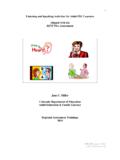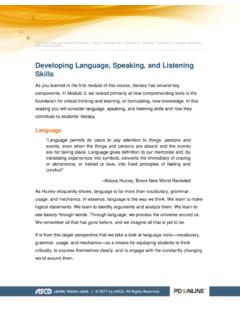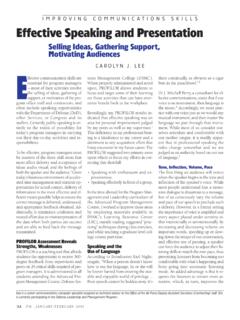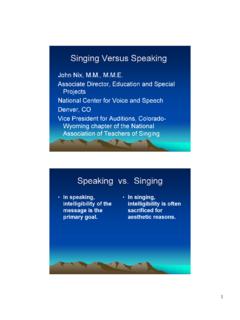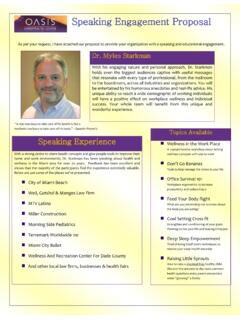Transcription of Speaking of “Tongues,” What Does the Bible Teach?
1 Speaking of Tongues, what does the Bible Teach? Dr. Malcolm B. Yarnell, III The Center for Theological Research September 2006 White Paper 8 Published by the Center for Theological Research at 2006 Malcolm B. Yarnell Permissions: The purpose of this material is to serve the churches. Please feel free to distribute as widely as possible. We ask that you maintain the integrity of the document and the author s wording by not making any alterations. For special requests please contact the editorial board for the White Papers for approval at The Center for Theological Research Southwestern Baptist Theological Seminary Fort Worth, Texas Malcolm B. Yarnell, III, Director Speaking of Tongues, what does the Bible Teach?
2 When two African theologians, Arius and Athanasius, squared off concerning the ontological relationship of our Lord and Savior Jesus Christ to God the Father, they both treated Scripture as Today, both men would probably affirm modern evangelical terminology concerning both inerrancy and sufficiency with regard to Scripture. However, facile or superficial affirmations of Scripture s inerrancy and sufficiency are simply not enough when it comes to forming true doctrine; there is also the critical issue of the orthodox interpretation of Scripture. Orthodoxy separates the Christian, Athanasius, from the heretic, Arius. Thus, interpretation can lead to either orthodoxy or heresy. Unlike postmodern Christians, who naively consider differing interpretations of Scripture to be a mere matter of openness or adiaphora [ indifference ], conservative believers recognize that the orthodox interpretation of Scripture preserves the faith of the people and glorifies God.
3 (We pray the Holy Spirit will guide the churches to the orthodox conclusion in the particular matter under discussion here.) On the other hand, errant and heretical interpretations may lead to unhealthy churches at best or false Christianity at worst. Misinterpreting the biblical teaching regarding Speaking in tongues is, fortunately, closer to the former than the latter. This essay is written in an effort to set out what this Southern Baptist believes is the orthodox doctrine of Scripture regarding glossolalia, or Speaking in tongues. what follows is a popular presentation of one tertiary aspect of the rich biblical doctrine of the Those desiring historical and experiential reviews of the modern phenomena of tongues should consult other The author recognizes that a number of close Christian friends will disagree; however, he begs those friends to consider the text and correct his interpretation according to the witness of that text.
4 Let us not allow the Corinthian corruption of glossolalia to bring division; may Love instead reign. The Biblical Witness Regarding Glossolalia There are a number of biblical passages cited by advocates of the various modern practices of Speaking in tongues. Rather than beginning with the positions of these modern advocates, it is best to consider the biblical passages in their canonical context. 1 James D. Ernest, Athanasius of Alexandria: The Scope of Scripture in Polemical and Pastoral Context, Vigiliae Christianae, 47 (1993): 341-62. 2 For an academic discussion of the Holy Spirit, one may consult the text and note structure of the chapter on Pneumatology in the upcoming book, A Theology for the Church, edited by Danny Akin.
5 3 For an authoritative review of the historical sources for the modern practices of Speaking in tongues, see Robert M. Anderson, Vision of the Disinherited: The Making of American Pentecostalism (Peabody: Hendrickson, 1979). For a poignant personal review of modern practices, see Neil Babcox, My Search for Charismatic Reality (London: The Wakeman Trust, 1985). Page 1 of 9 Speaking of Tongues, what does the Bible Teach? A White Paper for the CTR While modern enthusiasts begin with their personal experience, it is proper to begin with the witness of Scripture. The relevant biblical passages shall be considered below according to their primary or secondary impact upon the doctrine of glossolalia.
6 The theological implications of the biblical teaching will be drawn out. Thirteen conclusions regarding the biblical doctrine of glossolalia follow our scriptural review. Please take the time to consider the Scripture s witness with me rather than jumping to the thirteen conclusions, for the truth is in the biblical text. Historical tradition, personal experience, and rational conclusions are subservient to the Bible and must always be judged by the Bible . Primary Biblical Passages Regarding Glossolalia Mark 16:17-18: In this critically questioned yet infallible passage, after delivering the Commission, Jesus declares concerning believers, And these signs will follow those who believe: in My name they will cast out demons; they will speak with new tongues [glossais lalasousin kainais]; they will take up serpents; and if they drink anything deadly, it will by no means hurt them; they will lay hands on the sick, and they will recover.
7 These five amazing occurrences are labeled signs [semeia]. A biblical sign is an indicator of a deeper spiritual reality. In this case, the signs are intended to provide divine verification of the gospel of Jesus Christ (cf. Heb. 2:4). This gospel concerns Jesus life, death, resurrection, and continuing ministry, and the salvation available in and through Him by personal faith, a faith evidenced in the first submissive act of a disciple, baptism. Among the five signs, glossolalia appears second. The languages spoken would be new [kainais], indicating their relation to the speakers as something they had previously not learned. These prophesied signs found their fulfillment in the early days of the church, as recorded in the book of Acts, thus verifying the movement of God in the life of the early church (cf.)
8 Acts 3:7, 5:16, 28:3-6). The prophecy of Jesus concerning glossolalia was soon fulfilled at Pentecost (Acts 2), while there were subsequent fulfillments in Acts 10 and 19, echoing the structure of Christ s command concerning the successive movement of the gospel beginning from Jerusalem (Acts 1:8). Acts 2:4: After watching Jesus ascend to heaven, the disciples were gathered in prayer on the day of Pentecost. A fourfold phenomenon occurred where they had gathered: a heavenly sound of rushing wind filled the whole house, tongues like fire settled on each head, they were all filled with the Holy Spirit, and they began to speak with other tongues [lalein heterais glossais], as the Spirit gave them utterance. According to Peter, this event fulfilled the prophecy of Joel.
9 Peter was clear that the coming of the Spirit upon the church occurred in this miraculous, wondrous and significant manner (Acts 2:22) for the purpose of letting Israel know assuredly that God has made this Jesus, whom you crucified, both Lord and Christ (2:36). The Holy Spirit s gifting of tongues at Pentecost was explicitly to verify to Israel that the crucified Jew named Jesus is indeed God. According to Peter and Luke, who were inspired by the Holy Spirit respectively to speak and write what we have in Acts 2, the sign of Speaking with other tongues publicly conveyed the gospel of Jesus Christ. There are four aspects of this significant event Page 2 of 9 Speaking of Tongues, what does the Bible Teach? A White Paper for the CTR which must be grasped.
10 The first three aspects tell us about the speakers, the hearers, and the meaning communicated. The fourth aspect tells us why the communication occurred in the way it did. First, there is no doubt whatsoever that this was a miracle of Speaking in languages that the individual speakers did not know but that others in the Jerusalem crowd did know. From Parthia to Asia to Arabia to Egypt to Rome, multiple languages were being spoken by these provincial Galilean Christians. Second, these multiple languages were heard and understood by witnesses from around the world. The Christians conveyed information in actual languages to actual people that heard and understood those languages. what amazed the hearers was that the speakers should not have known their unusual languages.



